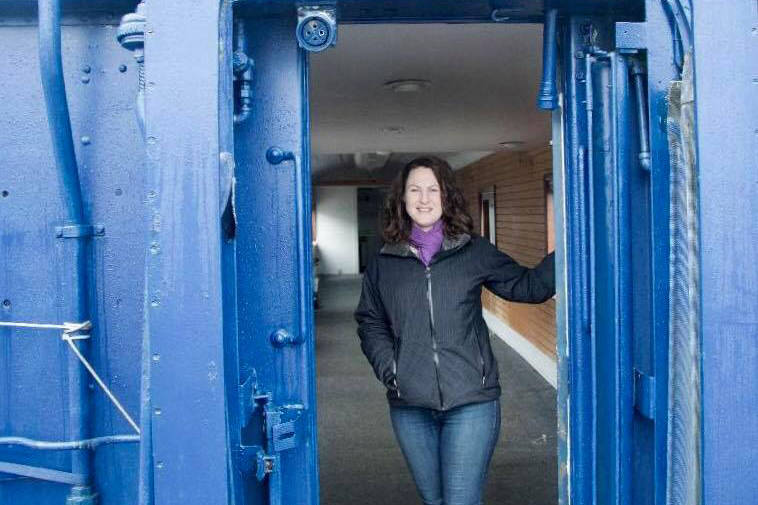As Liberty Miller steams forward to the opening of 13 Ravens Coffee House in the Train Rec near the Seward harbor, she continually highlights how helpful the surrounding community has been in her small business journey.
“It’s been really incredible,” said Miller, who plans to open 13 Ravens’ doors to the public this April. “I’ve never started a business but it’s been really easy. I’ve had so much help, mainly from people I know. Everyone has been reaching out to me, and working with the city has been super easy. Everyone has been really helpful.”
13 Ravens will be opening at The Train Rec, a collection of old Alaska Railroad train cars turned storefronts near the Seward Harbor. She’ll be filling the old home of Liquid Adventures, a kayak tour company.
“The train car location fell into my lap through friends and it was like, yes, I’m going to do this,” she said. “It has some of the best views, with the train car sitting right on the harbor.”
The location isn’t just good for the views, Miller said. The coffee house is conveniently located by the harbor, near the cruise terminal and the train station.
“It’s completely unique,” she said. “It’s pretty cool.”
Miller is just one of many younger entrepreneurs and new small business owners setting up shop in Seward and the surrounding Kenai Peninsula.
“We are so thrilled to have the young, millennial generation of people in their twenties and thirties deciding to become chamber members,” said Cindy Clock, executive director of the Seward Chamber of Commerce.
Clock said the chamber has seen recent growth. A lot of new businesses have recently chosen to be more involved and start using the different networking and business growth opportunities the chamber offers.
“We have seen a growth the past couple of years and I think it’s because people may have gone away, tried some other places and then realize they miss Seward,” Clock said.
Some new members grew up in Seward and have decided to start their business in their hometown, Clock said. Others have made Seward their home and are excited to start their small business in the community.
Miller falls into the second category. Originally from the Seattle area in Washington, Miller is excited to bring her homegrown love of coffee to her new home, Seward. She’s held different positions with companies throughout Seward while working toward opening 13 Ravens.
“We have young men and women, many of them do have a day job, but this is their passion and they are finding success because Seward is such a popular destination,” Clock said.
The Kenai Peninsula’s growth in small businesses is boosted by a network of localized and broader resources.
The Seward Chamber of Commerce offers a lot of opportunities to small businesses, from open houses to a planned social media course. Also on the peninsula, the Alaska Small Business Development Center, which as offices in Soldotna and Homer, has a trove of resources available.
“We’re probably Alaska’s best resource for starting a small business or helping an existing business grow,” said Kenai Peninsula Center Director Cliff Cochran. “We have a pool of data for industry averages, benchmarks … We have some of the best tools out there, some fantastic tools that are pretty pricey, but our clients get them for free.”
According to Cochran, of the hundreds of new or existing businesses the Small Business Development Center works with each year, there are three industries that stick out: accommodations and food services, manufacturing, or production and services.
These industries cover a wide range of businesses like vacation rentals, entertainment, fishing guides and more. Airbnb is boosting vacation rental businesses, Cochran said. The center is also seeing a rise in food trucks, farm and vegetable production, fishing guides and construction.
“We’re staying busy,” Cochran said. “The Kenai Peninsula center is one of the busier in the state per capita. Demographically, most of the startups are from Soldotna and Homer … Seward has a good amount too, but a little less because the population is less.”
Of the nearly 250 clients that the center works with each year, Cochran said that they see about 30 or so startup businesses each year. These businesses face the unique challenge of finding funding, an issue that Miller faced with 13 Ravens.
“Self-funding has become more popular,” Cochran said. “It’s a really soft market for lending, with lenders requiring 25 to 30 percent for startups, which is a fairly big minimum. A lot of folks don’t have that and we’ve seen a lot of people dip into their personal savings or try to partner with a local person with some capital.”
Miller is just a few weeks away from opening 13 Ravens’ train car doors, but her journey to small business owner hasn’t been all easy. She said she spent nearly four months finding the funding for the coffeehouse and, after a lot of rejections, was finally able to find an investor.
“Finding the funding was the hardest part,” she said. “I didn’t find an investor until almost January so it’s been really difficult, really stressful. Those months of asking everybody I know … There were a lot of tears. I’ve always been a pretty determined person, so even though a lot of people said ‘no’ I know it was going to happen.”
Miller’s bright orange espresso machine landed in Seward this month and is ready to start up in its new home.
“I’ve had a lot of people in my life that have helped me,” she said. “They have helped me in the way of encouragement and believing in me. It can be very frustrating, because I don’t have access to finances … I couldn’t tell you how many people I asked to invest and it was discouraging, but even people that couldn’t help financially were encouraging, cheering me on and that is what kept me going.”

